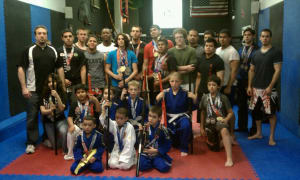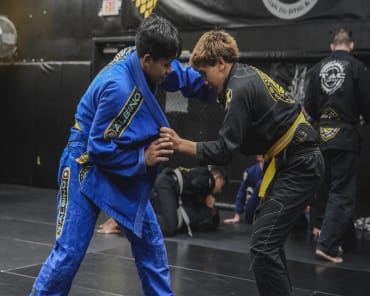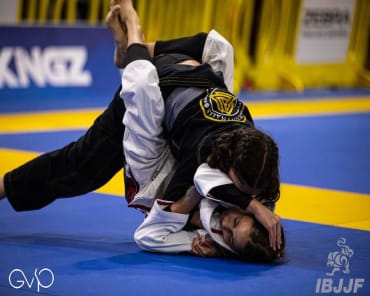
Brazilian Jiu Jitsu and MMA schools are everywhere nowadays. We've come a long way from the days where there might only be one or two schools in your whole state, and even fewer black belts. Times have certainly changed for the better, and with the rapid evolution of our sport, schools are sprouting up everywhere. So how do you choose the one that's right for you?
In my years of studying martial arts, I've been fortunate enough to travel all throughout the United States, visit many of the top schools, and train with countless world champions . In my 11 years of Jiu Jitsu I have visited over 50 of the best schools in the US, more than most practitioners will visit in a lifetime; and I feel that my unique experiences put me in a position that allows me to compare schools in a way that maybe no one else can. But rather than critique, I choose to use these powers for the good of all Jiu Jitsu humanity; so I'd like to go through some of the reasons to choose (and not choose!) a school.
-LOCATION: This has to be the number-one reason why people choose their school. Coming in fresh and unknowingly, most individuals who want to give this sport a try will venture into the academy closest to home. Maybe they've always wanted to try Jiu Jitsu, or maybe they saw the sign driving home from work and decided to stop in and see what its all about. If you get lucky, maybe a Lloyd Irvin or an ATOS set up shop right down the road from your house, and you've got a brilliant black belt just a hop, skip, and a jump away. In that case, you just hit the Jiu Jitsu lottery and your training and development is in good hands!
But what happens if you don't get lucky?
Things you're going to want to watch out for:
A: Some massive barbarian who looks like he just won his last bar fight. These guys are slamming each other all over the mats with reckless abandon, treating practice like its the UFC championship, and hurting each other left and right. STAY AWAY!
B: A traditional martial artist who feels that his accomplishments in his field of expertise (which are sometimes impressive) combined with his UFC watching experience, allow him to waltz right onto the mat with his black belt on and teach a BJJ class. I'm sorry Mr. Miyagi. It doesn't work that way.
C: A good, competitive black belt who may even be a world champion. But does he know how (or have the desire) to teach?
-SCHEDULE: It's important to find a place that offers a schedule you can swing. Let's face it, the greatest school on earth won't get you better if your work schedule doesn't allow you to ever make it to training.
-ATTITUDE: If you're not surrounded by a bunch of humble guys eager to help you at every turn, you're not doing it right. This art is intended to breed a level of humility and promote a friendly training environment. Good BJJ guys LOVE to help their training partners get better. Tough guy types walk into MMA gyms all the time (see guy A up above), but only the open-minded student who checks his ego at the door and is willing to dedicate himself to getting better should be welcome to train at your gym. Lots of guys start off like this as white belts, but they learn the lessons and become better people. If the purple belts at your gym are arrogant bullies, you're in the wrong place.
-TECHNIQUE: For me this is the biggest. I don't mind taking a little drive, and I can handle a bully better than most. So that leads me to my next big question. Does the stuff I'm being taught really work? If I'm going to be training somewhere, I have to be able to trust the instructor's technique and attention to detail. We've all come across that meathead white belt who thrashes around violently, hurts his training partners, and being encouraged to keep it up? I've seen it! And this is why people get hurt. A responsible professor will focus just as much on defense as he does on offense, probably more. My general rule: if you have blue belts who can't upa or elbow-knee escape I am NEVER coming back.
-VARIETY: If you're looking to become a well-rounded BJJ practitioner or fighter, you need a good mixture of gi, no gi, and take downs. I've been to outstanding schools who just don't balance out their regimens. Many schools have started offering curriculums offering only gi or only no gi, and ignoring the other one altogether. And lets not even talk about take downs! Almost nobody is teaching them! Its absolutely mind boggling to me that someone will specialize in ground fighting techniques, but will never teach you how to bring a fight to the ground. It makes zero sense how that still goes on in 2018 with so many reputable instructors in the fold. Stand up, self defense, and training without the gi are all equally important parts of the grappling puzzle. After all, the most important thing about training martial arts is learning to defend yourself. Why limit yourself to only knowing how to stop an attacker who wears a thick, rip-proof jacket?
These are just a few of the basic things I'd look for when choosing a school. Thanks to Google, it's pretty easy to find a few places nearest you, but Google and Yelp reviews are unfailingly biased, and no one is really telling the full story. Usually word of mouth is your best friend when choosing a place to train, but even then people don't always know what to look for. I hope everybody was able to get a little something from this, and if you have any further questions always feel free to drop me an e-mail at OdinsHallsBJJ@gmail.com and I'd be more than happy to provide you with a fair, unbiased opinion of which school would be right for you!







